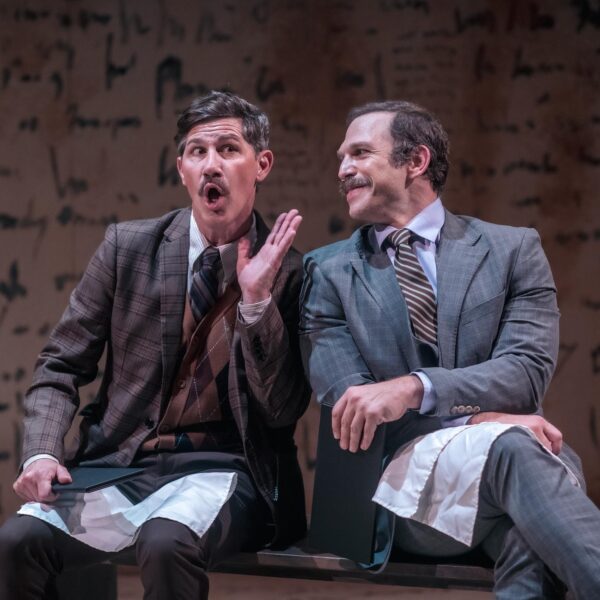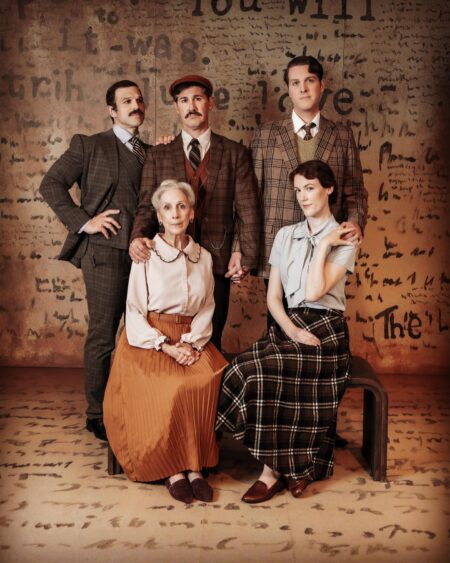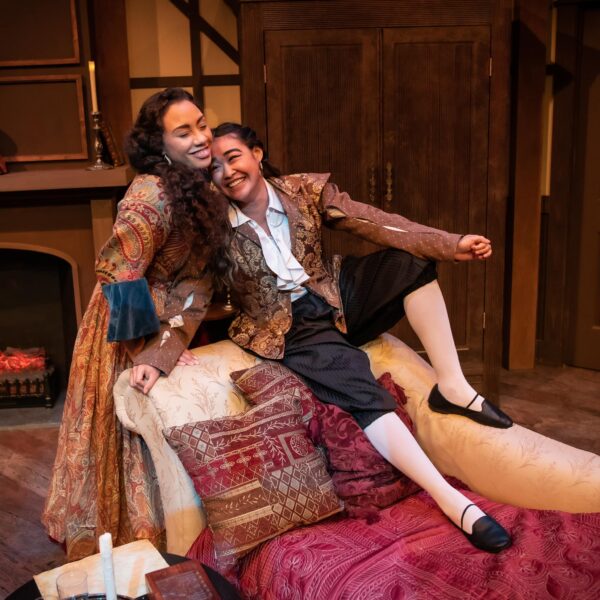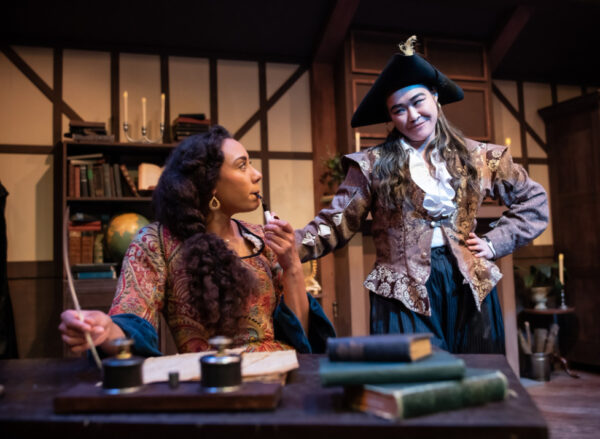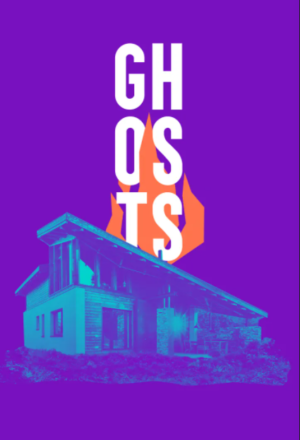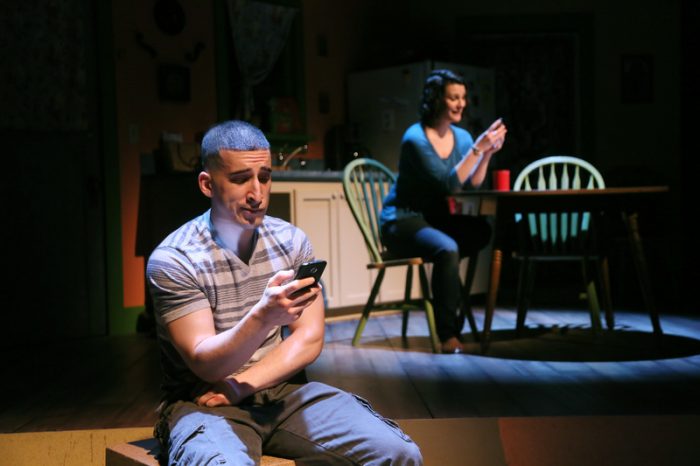
Joshua Chessin-Yudin and Aida Leguizamon in “The Happiest Song Plays Last” at 12th Avenue Arts through April 14, 2018. Photo: Ian Johnston
Review: The Happiest Song Plays Last by Quiara Alegría Hudes. Produced by Theatre 22. Directed by Julie Beckman. Scenic Design by Emily Sershon. Costume Design by Patrick Swett. Lighting Design by Ahren Buhmann. Sound Design by Kyle Thompson. Prop Design by Emily Sershon and Katie McKellar. With Aida Leguizamon, Joshua Chessin-Yudin, Lexi Chipman, Michael D. Blum, Rich Hawkins, & Agastya Kohli. Now through April 14, 2018 at 12th Avenue Arts/Capitol Hill.
Theatre 22 just opened The Happiest Song Plays Last, the final play in the “Elliot Trilogy”, three works by Pulitzer Prize winning playwright Quiara Alegría Hudes that center on a Puerto Rican-American Iraqi war vet from Philadelphia named Elliot. The semi-autobiographical plays feature characters and situations that are based on elements from the playwright’s life. The first two plays in the cycle have been previously produced by Theatre 22…Elliot, A Soldier’s Fugue was given a staged reading by the company in 2015 as well as a very well received full production of the second play, Water By The Spoonful that same year that introduces the character of “Yaz”, Elliot’s cousin.
The actors who portrayed “Elliot” and “Yaz” in that production were not available to reprise their roles for The Happiest Song Plays Last but director Julie Beckman does return to stage this final installment with an all new cast and for fans of Ms Hudes and her work, it’s a great pleasure to see this work staged. The playwright is much admired for her strong skills at conversational dialogue and creating fascinating multi-dimensional characters in interesting and unique situations. Her skills at intertwining those fascinating characters and the multiple plot threads of Water By The Spoonful are reasons why she won the Pulitzer Prize for Drama for that play. It was complex and thoroughly planned and thought out work and a great piece of dramatic writing.
Which leads us to the first issue with its sequel…it’s not quite as compelling and while it actually has a simpler structure with only two contrasting plots, it’s also less satisfyingly structured. The more numerous plot lines of Water By The Spoonful were all very carefully entwined to form a complete whole, while “Happiest” just plays ping pong back and forth between the plot involving Elliot, now an actor on location in Jordan making a war film and Philadelphia where cousin Yaz is attempting to become a community leader and nurturer like other strong women in her family.
Both plot threads have interest but they’re just not as complex and in depth as the previous play…they both feel like “B plots” in an ongoing dramatic series on cable tv; neither one is really compelling enough to stand entirely on its own. And, to be fair, the stories do have interest…Ms Hudes has created a pair of well rounded characters with Elliot and Yaz and you do become involved with their ongoing lives and what they’re currently dealing with: Yaz with a complicated relationship with an older man in her life and a sustained need to nurture and care for people, and Elliot dealing with issues of PTSD related to his war experiences in Iraq that included the trauma of unintentionally killing an unarmed civilian.
Ms Hudes is also smart to include an interesting array of supporting characters for the cousins to interact with but because of the geographic distances between the characters and their through lines, we’re missing the various connections and interwoven plots that made the earlier play so compelling. Frankly, because of this bilateral nature, “Happiest” could use a couple more characters…each of the two sections feel under populated. Yaz has only Agustin, the older man she is involved with, a local musician, and a neighborhood homeless guy named Lefty that she feeds and supports. Elliot in his plot, also has two characters/threads to deal with: a growing attraction to his attractive and intelligent young co-star Shar who is herself of partial Arabic heritage and a growing bond with Ali, an Iraqi illegal immigrant living in Jordan who is an adviser and production assistant on the film they are making.
These two plots do have interest, with Elliot’s being the stronger of the two as he deals with his wartime PTSD which is flaring due to the fact he’s recreating actual actions, in the course of filming the movie, that led to his original trauma. His growing relationship with Shar is also of interest but the strongest bonds are formed with Ali who must also deal with after effects of the Iraqi War but from the other side of that equation. The relationship between Elliot and Ali is the strongest and most interesting one in the play and it’s the one I wish Ms Hudes had focused more on than some of the other threads.
So, The Happiest Song Plays Last, as a play, has strong things going for it but it doesn’t live up to the very high standards of the prize winning previous play in the trilogy and I’m afraid I also have to say that this specific production of this play isn’t up to the very high standards set by Theatre 22 with their 2015 production of Water By The Spoonful which frankly had a stronger cast and more imaginative design choices.
While there are things to admire about Aida Leguizamon’s portrayal of Yaz, there are also times where she feels tentative in the role…there’s a lack of confidence and commitment in the way she approaches the material. As Elliot, I did enjoy much of what Joshua Chessin-Yudin brought to the role but he frankly seems a little young for the part…there’s a lack of gravity and maturity in the performance. Elliot needs to feel a bit world weary and bruised by his experiences but Mr. Chessin-Yudin seems like he’d be better cast in the first play in the cycle, Elliot, A Soldier’s Fugue where the character is 19 as opposed to the more scarred version of Elliot in “Happiest”. It’s a strong performance by the actor, with a very emotional scene at the end of the play that he plays with great passion, but I’d love to see what flavors he could bring to this role in 5 or 6 years time.
The supporting cast features very solid work from Agastya Kohli as Ali, Lexi Chipman as Shar, and Michael D. Blum, as Agustin, the object of Yaz’s affections, but I most enjoyed Rich Hawkins as the perpetually baffled homeless guy Lefty, who brought a sweet charm and sense of naive realness to the role.
The design elements were also solid with Emily Sershon deserving a shout out for a clever set design surprise revealed late in the play.
Yes, it’s a bit of a mixed review for The Happiest Song Plays Last as both play and production. It’s still worth checking out mostly due to Quiara Alegría Hudes skills as a writer and the characters she has created. But, because those skills were at their peak with the play immediately preceding this one, poor old “Happiest Song” suffers a bit in its shadow as does the production as a whole. It’s a pretty good show but…it has huge metaphorical shoes it doesn’t quite fill.


